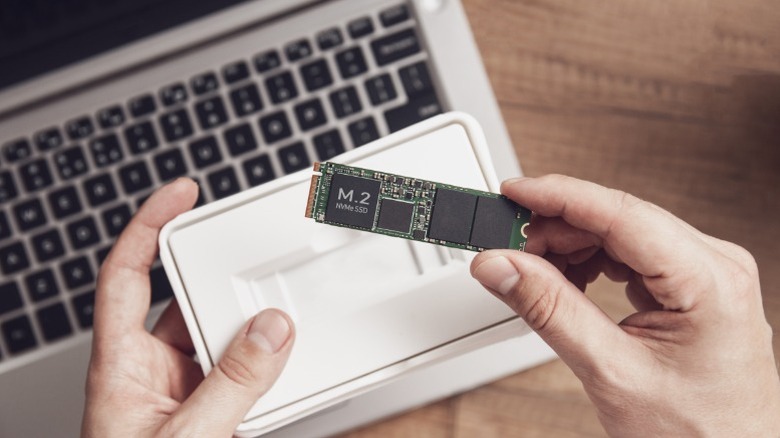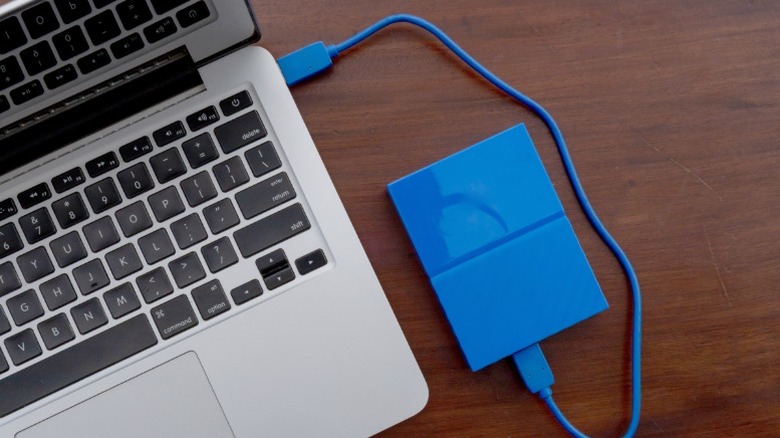What's The Most Storage A Laptop Can Have?
We may receive a commission on purchases made from links.
Many high-end laptops ship with internal storage capacities of 1TB or 2TB — which can be plentiful for the majority of buyers. However, if your workflow involves working with larger files, say content creation or 3D rendering — you realize just how quickly storage space can run out. Though cloud storage services like Google Drive will always continue to be a convenient option — they're not suitable if your work demands instant access to files, especially in the absence of a solid internet connection.
This is where scoping out the perfect hardware for your laptop gets important. Laptops with 2TB of SSD storage aren't difficult to come by, but most base model ultrabooks start at close to 500GB — even worse if you're shopping for a MacBook Air, which only gets you a measly 256GB of internal storage. It's also imperative you find out if a laptop uses soldered storage — in such a case, upgrades won't be possible post-purchase. MacBooks and certain Windows laptops come with soldered SSDs, and the only time you can upgrade the capacity size is during checkout.
That said, Windows laptops generally benefit from the convenience of swappable storage and RAM. The extent to which you can increase your laptop's internal storage depends on the kind of connectors it supports and the number of available slots it has. That's not your only option for storage space, either, as external options are plentiful. Put simply, laptops can have a varying amount of storage, there's not necessarily a maximum.
Internal storage upgrade options in laptops
If your laptop is relatively new, chances are that it relies on the M.2 form factor for its storage. M.2 NVMe SSDs are small, fast, and available in various capacities. Common storage tiers include 250GB, 500GB, 1TB, and 2TB — but flagship consumer-grade NVMe SSDs you can buy can go up to 8TB in storage capacity. So, if your laptop has a single M.2 slot, you could swap the existing SSD out and fit in an 8TB stick.
Some laptops, like the Dell XPS 17, come with two M.2 slots — allowing you to theoretically carry around 16TB of internal storage with your laptop. Older models might still use a 2.5-inch SATA drive slot — in which case you will have to find an appropriate SSD or HDD that fits. The easiest way to check which kind of storage your laptop uses, or if it can even be swapped out for an upgrade, is to refer to the tech specs for your specific model. Some ultrabooks can be difficult to pry open without getting scuffed up — so seeking support from a professional is recommended.
It's also important to distinguish between a SATA M.2 SSD and an NVMe M.2 SSD. The former still relies on older SATA-based technology and has considerably lower read and write speeds than NVMe drives. Understanding M.2 SSDs can get tricky, especially with the many types and sizes they come in.
External storage can come in clutch
Technically, any form of storage you can pair with your laptop counts — and if you do exhaust your internal upgrade options, external drives are always going to come in handy. For instance, you have the popular My Passport range of USB 3.0 external hard drives by Western Digital. Though not as fast as SSDs, these can be a highly cost-effective option if you're looking for archival storage or extra space for operations that you do not mind running a bit slower.
That said, if your budget allows, it is always recommended to go with an SSD — they're faster, lighter, smaller, and far more resilient to drops than spinning mechanical hard drives. Some of the fastest portable SSDs you can buy boast read and write speeds of up to 3,000 MB/s. Compared to internal M.2 solutions, this number might be lower — but the right external SSD will allow you to access files and write to them without any hiccups. You can perform 4K video editing without having to offload all media to your laptop's internal storage, or even run games directly via a portable SSD.
Many of the fast SSDs advertised online rely on the newer USB-C connector type and may only deliver max speeds if your device's USB-C port is Thunderbolt-compatible. The Samsung T7 Portable SSD is a popular pick and is available in a maximum storage capacity of 4TB.


